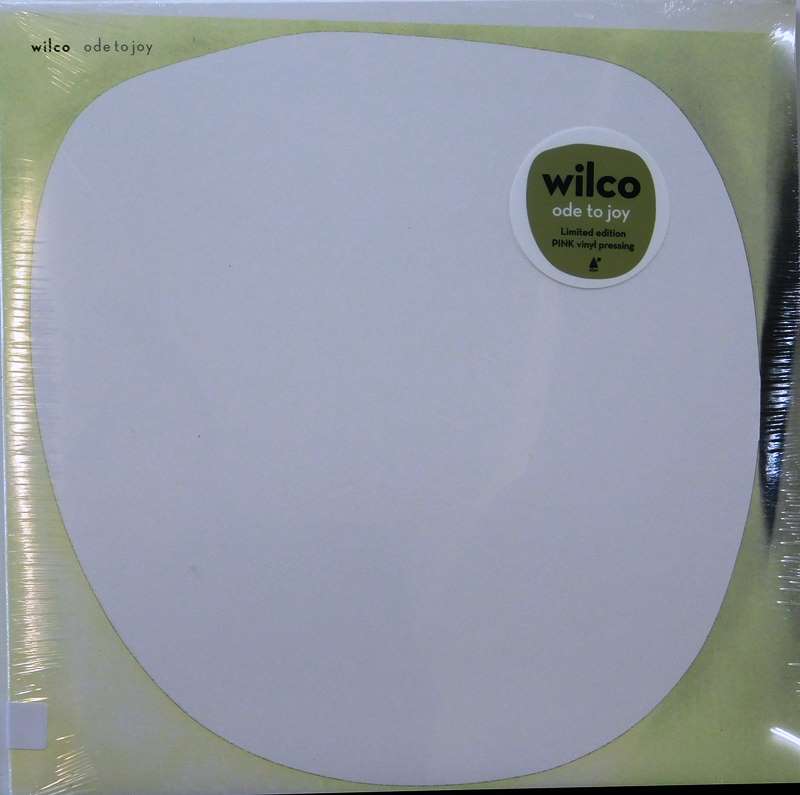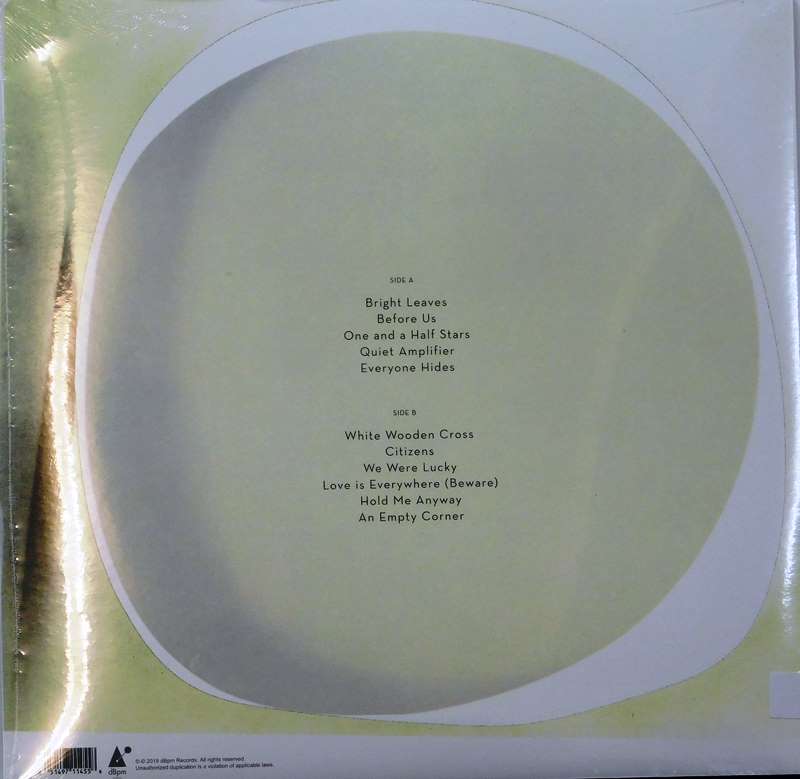

| Product Code: | DBPM-101-20-LP |
| Artist: | Wilco |
| Origin: | USA |
| Label: | dBpm Records (2019) |
| Format: | LP |
| Availability: | In Stock |
| Condition: |
Cover: M
Record: M
|
| Genre: | Country , Folk , Rock , World N |
Brand new sealed LP, Album, Limited Edition, Pink Vinyl.
Weariness sounds good on Jeff Tweedy. Much of the power and beauty across Wilco’s discography has resulted from their founder and frontman sounding beaten-down by life on Earth, reflecting back his listeners’ struggle to make sense of their own messy existence. Tweedy is better than most at crafting punchy pop songs and rousing rockers, but he unlocks some kind of special songwriting magic when he digs into his own pain and fatigue and peers out at the world through bleary eyes, bewildered but still clinging to hope. Stare back long enough and his ache becomes indistinguishable from your own.
Throughout the latter half of Wilco’s career, though, Tweedy has just as often simply sounded spent. The old ennui remains a mainstay of his catalog, but the breathless inspiration has accompanied it less and less frequently. We can argue in circles about when Wilco’s decline began and how far they’ve fallen from the storied run that established their place among history’s greatest American rock bands, but to these ears, ever since they settled into a consistent lineup in the interim between 2004’s A Ghost Is Born and 2007’s Sky Blue Sky, the thrill has been slipping away like air slowly but surely escaping a balloon — a falling off that seems to befall even the best musicians eventually. Even 2011 career overture The Whole Love, the high water mark of Wilco’s stability era, mostly found them retracing their steps, bringing fresh zest to familiar maneuvers.
Since then, Tweedy has maintained a prolific if uneven creative output. Besides two Wilco albums (2015’s restlessly scrappy Star Wars and 2016’s elongated sigh Schmilco), he made a double-LP with his son (2014’s Sukierae), recorded new acoustic versions of his old classics (2017’s Together At Last), and released a pair of proper solo records (2018’s WARM and this year’s WARMER). He also ramped up his production work for other artists, embarked on an assortment of fun extracurriculars, and wrote a revelatory memoir that cemented his reputation as the former all-star who’s still good for a home run here and there but whose greatest value is his presence in the dugout.
He had good reason to reflect on his life. This has been a tumultuous decade for Tweedy; his wife endured successful but arduous cancer treatments, his sons grew up and moved out, and his father died unexpectedly, all while a cloud of anger and alienation settled in over American life in general. As he worked through all this on the page, he also began revisiting his past on record. The dreary and understated Schmilco was the least essential, least compulsively listenable Wilco release to date, an album that took work to love from a band whose albums used to be spellbinding on impact. But like most of Tweedy’s late-career work, it was a grower, and in hindsight it may have been the sound of a legendary artist rebooting before a renaissance.
In tandem with the literal revisitation Together At Last, Schmilco tracks like “Normal American Kids” and “I Never Was A Child” saw Tweedy engaging with his own history more directly than ever. The process began to yield greater rewards on WARM, where he sometimes seemed to be grappling directly with his own legacy. On opener “Bombs Above,” he confessed, “I leave behind a trail of songs / From the darkest gloom to the brightest sun / I’ve lost my way but it’s hard to say / What I’ve been through should matter to you.” Later, the pointedly titled “Having Been Is No Way Way To Be” rebuked the notion that a recovering addict ought to get back on drugs to get his creative juices flowing: “I just got tired / Shining steady like a spider web’s an empty stage / Now people say / What drugs did you take / And why don’t you start taking them again? / But they’re not my friends / And if I was dead / What difference would it ever make to them / If I got high?”
Such directness and vulnerability was striking, especially coming from a songwriter who has so often shrouded his feelings in the oblique, ambiguous, and surreal. Furthermore, addressing his own biography head-on seemed to jumpstart Tweedy’s writing about other subjects too, be it the tender reassurances “Don’t Forget” and “I Know What It’s Like” or the contagiously fun “Let’s Go Rain,” a half-serious plea for God to wipe the Earth clean with another global flood. Within Tweedy’s own world, WARM’s homespun folk-rockers were far from a reboot of biblical proportions, but he sounded rejuvenated and on the brink of a creative breakthrough. And with Wilco’s new album Ode To Joy, that breakthrough has arrived.
Superficially, Ode To Joy is not so different from the albums that directly preceded it. Tweedy is still practically muttering his lyrics under his breath, rarely pushing his voice beyond a relaxed sigh up into the piercing high-register melodies that used to lend his songs such a jolt. The band continues to burrow into moody atmospherics and textured grooves in lieu of grand gestures, as if they’ve turned their former sky-high ambition inward. Yet with this batch of songs, they’ve figured out how to infuse a new-school Wilco record with old-school Wilco’s dynamism and grandeur. The result is their most stunning body of work since A Ghost Is Born.
Much of that has to do with production and arrangements that call back to the group’s studio-tinkering heyday. From the very first moments of opener “Bright Leaves,” Glenn Kotche’s adventurous, shape-shifting drums are front and center in the mix, his cracking snare jolting life into songs that might have been insufferable dirges. Swaths of melody and noise build up and dissipate like passing weather patterns that occasionally become supernatural events. Ode To Joy mostly exists within the Bible-black predawn that fomented some of Tweedy’s finest slow-burn ballads; think “Sunken Treasure” and “In A Future Age” and “Radio Cure” and “Wishful Thinking” and the first Loose Fur LP.
These raw, skeletal, noisy explorations glimpse those old glories without sounding like retreads because Tweedy and friends have a new normal to circumvent. At the peak of their powers, they were deconstructing the pop-minded alt-country Tweedy had helped to pioneer with Uncle Tupelo and his earliest Wilco recordings. Ode To Joy dissects the version of Wilco that emerged when they shed their skin and once again became a rock band playing together in a room, albeit a very different rock band than the one that made A.M. and Mermaid Avenue. Latter-day Wilco is leaner and lither, and the revolutionary version of latter-day Wilco follows suit.
Tweedy breathes gorgeous imagery into these canvases, ruminating on the personal and universal with his signature blend of bleeding heart and wry raised eyebrows. He marvels at the endurance of his marriage on “Bright Leaves,” a song that really does sound like fallen foliage drifting across city streets, and “We Were Lucky,” a Nels Cline noise rave-up they added at the last minute because, per Tweedy, “I really wanted there to be a catastrophe on the record.” Naturally, he also wonders how he’d cope with losing his wife on the touching but musically inert “White Wooden Cross.” He extends empathy on the brisk “Everyone Hides,” attempts to bridge an impossible gap within the gorgeous tension of “Quiet Amplifier,” and delivers a “Desperado” for people who hate the Eagles on the tender album-closing “An Empty Corner.”
Ode To Joy is an album about seeking hope and meaning in a world that seems to be decaying beyond repair, so it’s fitting that Wilco saved some of the best musical flourishes on for the songs where Tweedy zooms out to reckon with the state of humanity at large. The staggering “Before Us” builds from downtrodden whispers (“Remember when wars would end? Now when something’s dead, we try to kill it again”) to monumental swells of beauty encircling the refrain, “Alone with the people who have come before us.” The political “Citizens” repeats the phrase “white lies” until you’re forced to hear every possible meaning, all while the band builds nervous energy around a minimal groove. Lead single “Love Is Everywhere (Beware)” uses guitar curlicues to poke holes in the notion that good will prevail without any effort on your part.
That song leads directly into its thematic cousin “Hold Me Anyway,” a stunning twilight pop-rocker where Tweedy blessedly lends his voice to the sort of soaring melody that has proven elusive in the latter-day Wilco catalog. It’s a nearly perfect unity of Wilco’s various eras, at once a wistful mirage and an urgent call to arms. As harmonized guitars slice across melancholy keyboard chords, Tweedy — who talks in his book about how badly he wants to discuss mortality at dinner parties — poses some questions most people try to avoid thinking about: “When you die, who’s to blame? Did you think everything would be OK?”
If Tweedy is urging his listeners to wake up from their stupor, he’s doing so from a place of humility. Among the album’s prettiest and least complicated songs, “One And A Half Stars” depicts a battle to keep pushing forward when you could just as easily stay in bed. It’s one of the most relatable tunes on an album full of them, Tweedy espousing his desire to change and the inertia that sometimes feels impossible to overcome. “There is no mother like pain,” he suggests at one point, before concluding with a lament: “I can’t escape my domain.” With a title that seems to refer to unenthusiastic reviews, it’s hard not to hear the song as another referendum on the state of his own creativity. Yet Ode To Joy is proof that Tweedy and his band can still wring exhilaration from exhaustion.